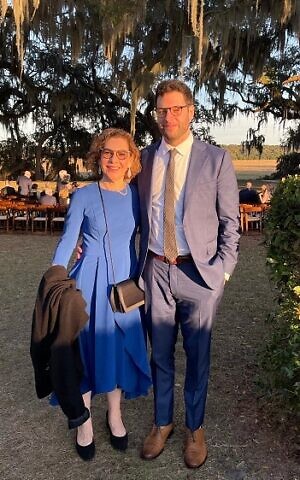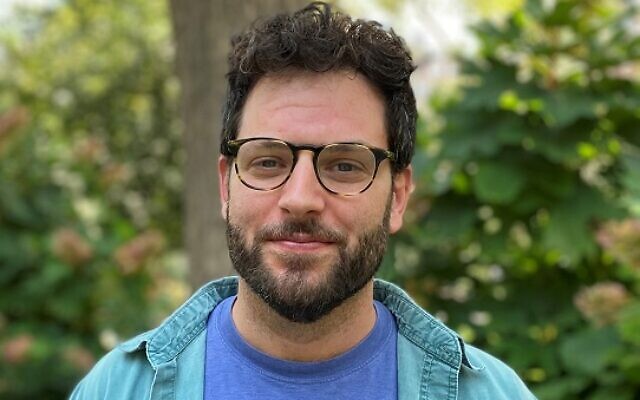Former Atlantan Raises Money to Help Afghans
Nat Rosenzweig, an Epstein and Weber alum, credits his Holocaust survivor grandparents for his GoFundMe effort on behalf of Afghan refugees.
As cable news networks and newspaper headlines continue to remind us, it has been a year since the last American troops withdrew from Afghanistan in a hurry, leaving refugees struggling to board or to cling to the last planes leaving Kabul airport. For one former Atlantan, those images resonated deeply.
“It’s hard to believe it’s been a full year,” said Nat Rosenzweig, the 34-year-old son of Atlantans Michael Rosenzweig and Shelli Bank. It was about a year ago that Rosenzweig began chatting with two Afghans in hiding in Afghanistan over the social networking app Clubhouse. Today, he is about halfway toward meeting his goal of raising $50,000 via GoFundMe to help the two young men escape the country and reach the U.S.
“It doesn’t seem like it’s been a full year that I have been talking to these guys, who have been in hiding and staying sane, hardly able to leave their apartment,” said Rosenzweig, who attended the Epstein School and Weber School in Atlanta, as well as Camp Ramah Darom, and now works as a paralegal in the music industry in New York. He had been chatting on Clubhouse for less than a year.
More than 6,700 miles away, months after Rosenzweig first entered the chatroom, two Afghan roommates — using pseudonyms Sayed and Safi — joined the chat at a friend’s suggestion. The two had worked for the Afghan government and now had to protect themselves and their families from the Taliban. One had actually worked for an affiliate of the U.S. military. For Rosenzweig, the conversation was both eye- and heart-opening.

In a conversation with the AJT, Rosenzweig said he wasn’t sure why the precarious predicament of the two young Afghans touched him so much that he actually took steps to help them.
Perhaps, he said, it was the “awareness of having descended from refugees and recognizing how fragile the human condition could be and how quickly things could change.” Rosenzweig also noted the “profound difference people can make” in helping another person. He mentioned the Jewish value of tikkun olam, or repairing the world.
Rosenzweig never met his paternal grandfather. According to his mother, Shelli Bank, three of his four grandparents were Holocaust survivors.
“But Nat grew up with my parents,” she said. Her mother died two years ago; her father died in 2011 at almost 100 years old. “My parents were very much a part of Nat’s life.”
Bank said her parents were not typical Holocaust survivors, although her father had been in a ghetto and then a concentration camp until the end of the war.
“He didn’t dwell on the past. He used to say, ‘except for the Shoah, I had a pretty good life.’ He never identified as a survivor. He identified himself as a Zionist, as a Jew,” she said. Both of Bank’s parents, however, had had experiences in which someone had shown them kindness. After the war, they worked for a time at the Joint Distribution Committee, a Jewish relief organization.
Rosenzweig said he has been happy with the response to his fundraiser. “I was afraid for a while that the Afghan situation might have been eclipsed by the war in Ukraine, but it hasn’t,” he said. One of the two Afghans has requested humanitarian parole, which is the most common way to get into the U.S., but his chances are low, Rosenzweig said.
The other young man applied to the master’s program in global political economics at the New School in New York City and received a scholarship, but it only covers part of his expenses. If he can raise the rest of the money, he will most likely be able to receive a student visa, according to Rosenzweig.
Prior to an article by the Jewish Telegraphic Agency about his fundraising appeal, Rosenzweig said that an appeal to family and friends, as well as friends of his parents, had resulted in donations and words of support. “Since the article, I recognize fewer names of donors,” he said.
“I had posted my GoFundMe on Instagram and a Jewish friend of mine shared it and that’s how the JTA learned” about his efforts, Rosenzweig explained. “If it works, I feel this will have proven what you can do” as one person. “If you put stuff out there, you don’t know where it’s going to go. That’s true of anyone, but more true of the Jewish community.”
Rosenzweig continues to chat with his new friends in Afghanistan multiple times a week, usually via WhatsApp. “I don’t know where this could lead for me. Nor do I know where it will lead” for Sayed and Safi, the Afghan roommates.




comments